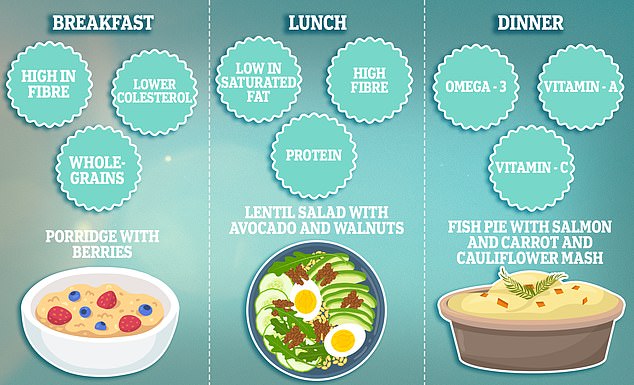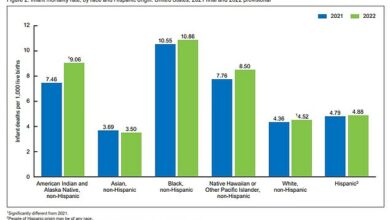Science-Based Diet That Reduces Dementia Risk in Women


A diet rich in berries, nuts and leafy greens may improve memory, but only in women, research shows.
Following the Mind diet — which stands for Mediterranean-Dash Diet Intervention for Neurodegenerative Delay — was associated with lower rates of cognitive impairment, a precursor to dementia.
But the results were not the same for both sexes, suggesting it may only work for women. Women are at much higher risk of developing dementia than men.
Researchers analyzed data from 14,145 people with an average age of 64, who were followed for an average of ten years.

A meal plan that follows the MIND diet. Porridge for breakfast, lentil salad for lunch and fish pie for dinner
They conducted a year-long food survey, with scientists analyzing how closely the foods people ate matched the Mind diet.
One point was awarded for adherence to the diet, for example three or more servings of whole grains per day or six or more servings of green leafy vegetables per week.
They also received points for four or fewer servings of red meat per week, one or fewer servings of fast food or fried foods per week, and five or fewer servings of pastries and sweets.
According to the findings published in the journal Neurology, the total number of points to be achieved was 12.
The people were then divided into three groups, with the low group having an average score of five for their diet, the middle group having an average score of seven, and the high group having an average score of nine.
At the beginning and end of the study, thinking and memory skills were measured.
Cognitive impairment, which involves difficulty remembering, learning new things, concentrating or making decisions that affect daily life, developed in 532 people (or 12 percent) in the low-diet group during the study.
It also occurred in 617 people (or 11 percent) of those in the middle group, and in 402 people (or 10 percent) of those in the high group.
Researchers found that the risk of cognitive impairment decreased by 6 percent in female participants who followed the diet most closely. However, there was no reduction in risk in men who followed the diet most closely.
People who followed the Mind diet most closely also declined less quickly than those who did not. This association was stronger among black people than among white people.
Experts say more research is needed to understand these differences and acknowledge limitations, such as self-reporting of diet, which can lead to inaccuracies.
Study author Dr Russell Sawyer, from the University of Cincinnati in Ohio, said: ‘Given that the number of people with dementia is increasing as the population ages, it is critical to find changes that can help us slow or delay the development of cognitive problems.
‘These findings warrant further research, particularly to investigate the differential effects in men and women and in black and white people. But it is also interesting to consider that people can reduce or delay their risk of cognitive problems by making a few simple changes to their diet.’
Previous research has shown that the Mind Diet can protect the brain by reducing oxidative stress and inflammation thanks to its high concentrations of vitamins, carotenoids and flavonoids.
According to experts, it may also reduce the risk of heart disease, diabetes and certain cancers.
Dr Jacqui Hanley, head of research at Alzheimer’s Research UK, said: ‘There is a wealth of evidence that a healthy, balanced diet can help protect our brain health.
‘Larger and longer-term studies are needed to better understand this effect. These should be conducted in a more diverse group of people.’




